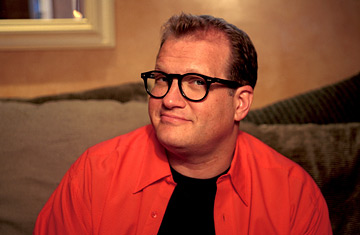
TV networks and movie studios are engaged in the programming equivalent of stocking up on canned goods in case the big one hits. The big one would be a strike, which looks a lot more likely now that the Writer's Guild of America (WGA), the union that represents 12,000 film and TV writers, voted this week by a margin of more than 90% to authorize their leaders to launch a walk-out when their contract expires at the end of this month. The last WGA strike in 1988 cost the industry an estimated $500 million. This time, "every producer, network and studio has a contingency plan based on an Oct. 31 deadline," says Barbara Brogliatti, spokeswoman for the Alliance of Motion Picture and Television Producers (AMPTP). "The screens will not go black."
Screens may not dim, but first TV and then the movies will look different if the two parties can't come closer together. The deal-breaker in the negotiations between the WGA and AMPTP is new media content. Those pithy webisodes of The Office and Battlestar Galactica? Someone wrote them, and wants to get paid when you play them on your iPod. In order to avoid a strike, said WGA West President Patric M. Verrone in a statement, "What we must have is a contract that gives us the ability to keep up with the financial success of this ever-expanding global industry." AMPTP says new media is still too new, and revenue is too unpredictable to set up a compensation package that resembles the one used for TV shows, in which writers get paid every time their rerun of Golden Girls airs.
No network or studio executive wanted to be quoted about specific strike plans, citing a desire to keep strategy a secret from the competition. But industry folks did share a broad idea of what to expect.
On TV, almost immediately, topical shows would look different. By December, viewers would have to find alternatives to some of their favorite scripted shows. Such as:
1) A heavy dose of reality and game shows: Imagine, if you will, a scenario in which Ryan Seacrest and Drew Carey spend even more hours a week on television. Unscripted shows like FOX's American Idol and CBS's The Price is Right will fill up schedule holes much the way TV newsmagazines did during the last writers' strike. That's how Hard Copy came about.
2) Late-night ad libs: Jay Leno and David Letterman have been through this before. They ended up curtailing their monologues and, in Letterman's case, resorting to a Top Two List. But Jon Stewart and Stephen Colbert haven't had to do without their crack writing teams. Expect minimal monologues from all funnymen, and maximal celebrity interviews.
3) The British Invasion: The major U.S. networks may look more like BBC America as content from abroad fills the void. The U.K. version of The Office, with Ricky Gervais, is an obvious substitute for Steve Carell's NBC version. And Footballers' Wives would do for ABC's Desperate Housewives in a pinch.
4) Developing newbies: Normally this time of year, struggling new shows are fighting to stay on the air. But newcomers like CBS' Cane, FOX's K-Ville and ABC's Big Shots will have longer to build an audience because networks won't be able to ramp up production on a mid-season replacement in a strike. This may not be a bad thing. Patience launched Seinfeld.
5) Reruns: Remember those things networks used to put on air in the summer in the olden days, before Dancing With the Stars was invented? They may resort to them again, giving us all a chance to finally figure out what's happening on Lost.
Because the production cycle for films is longer than TV, it would take a much longer time to see the impact of a strike at movie theaters. In fact, the multiplex wouldn't even begin to show signs of wear until 2009:
1) Mass immigration: International writers aren't covered by the WGA, so studios would say si to more foreign films. And A-list foreign-language directors like Pedro Almodovar, Guillermo del Toro and Ang Lee would become the industry's go-to guys.
2) More bad movies get a shot: Weak, stockpiled movies that might have gone straight to DVD would get a theatrical release. Finally, good news for fans of the American Pie sequels.
3) Doc stocks: More documentaries, the movie equivalent of reality programming, would make it to the big screen. Maybe even someone besides Michael Moore could make some money off them.
4) Theaters go live: One trend already underway, live cultural and sports events showing at movie theaters, could get a boost. After all, nothing says date night like catching The Magic Flute at the mall.
